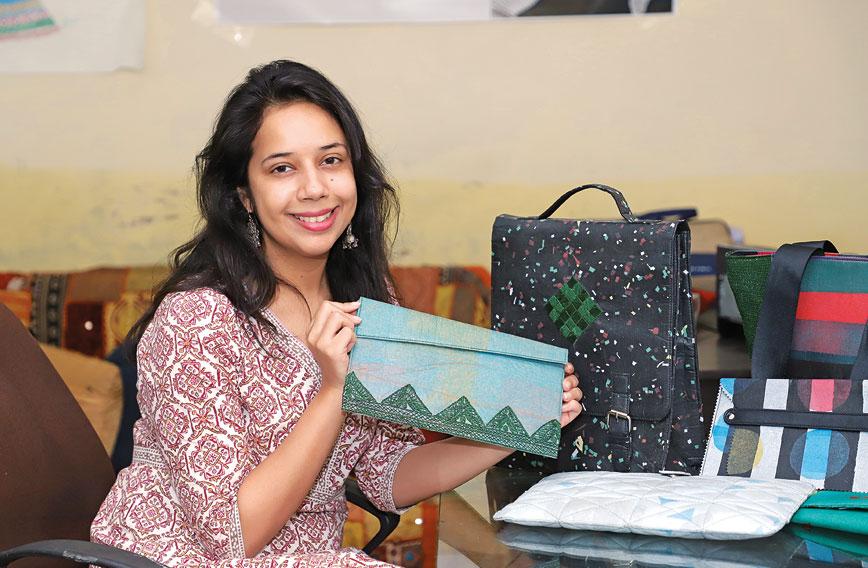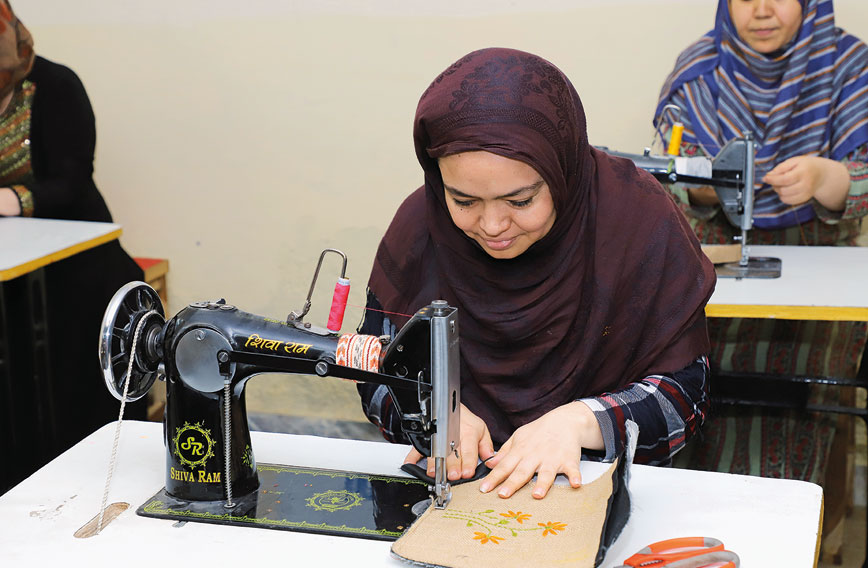
Kanika Ahuja: 'Lifaffa creates bags, but the material can be used to make lampshades, table mats, blinds and even footwear.' | Photograph by Shrey Gupta
Plastic into products: Upcycling the Lifaffa way
Rwit Ghosh, New Delhi
Kanika Ahuja is the CEO of Lifaffa, an enterprise that converts plastic waste into sheets and then crafts them into fashionable products. Lifaffa is training smaller groups down the value chain so that they can become micro-enterprises.
Kanika is not just upcycling plastic but also upscaling the work of Conserve India, an NGO founded by her parents, Anita and Shalabh Ahuja, in 1998. The NGO initially focussed on energy efficiency and then moved on to tackling the plastic menace in Delhi.
They zeroed in on thin plastic bags. These bags don’t have any resale value so they become an environment nightmare and leach into soil and water. Cows eat thin plastic bags and die.
Conserve India experimented with a process which converted plastic into sheets from which they made products like seat belts, life jackets and even tyre tubes. Mostly, these would be exported to countries in Europe where environmental consciousness was high.
But over the years, the Ahujas felt that Conserve India had simply become an export company. That wasn’t their objective when they started. For a while, they shut down their factory and began to work on other projects their non-profit was involved in.
“In 2017 we noticed that the market for sustainable products was picking up in India,” says Kanika. “So we launched Lifaffa as an independent social enterprise.” They thought things through and decided that they wanted to revive their plastic project but would now train groups in upcycling discarded plastic bags and decentralising production in India.
Lifaffa also got funding from Ashoka, an international non-profit that identifies and helps social enterprises round the world. “Lifaffa is now the marketing brand for the three groups that we train in converting plastic into saleable products,” says Kanika.
Currently Lifaffa makes accessories such as handbags, notebooks, laptop sleeves and wallets at prices from Rs 600 to Rs 4,950.
Lifaffa uses low-density polythene bags and multi-layered plastic bags like discarded chips packets to create fabrics. The plastic is collected, washed and sorted according to its colour. No dyes are added.
The plastic bags, according to their colour, are then layered on top of each other and compressed by a machine. The final product is a sheet of thin plastic fabric. This is then cut and stitched into attractive bags.
“For now, Lifaffa creates bags, but the material can be used to make lampshades, table mats, blinds and even footwear,” says Kanika.
Selling their finished products is not a problem, says Kanika because in the past 15 years Conserve India has developed a network of likely buyers. “We had our buyers — retail shops which would take products from us. We would train groups and then market their products under the brand name of Lifaffa,” she explains.
 Lifaffa has recently started working with Afghan refugees | Photograph by Shrey Gupta
Lifaffa has recently started working with Afghan refugees | Photograph by Shrey Gupta
Lifaffa is training three groups: rag-pickers, a tribal group in Nashik in Maharashtra and Afghan refugees in Delhi. The rag-pickers convert plastic waste into fabric whereas the tribal group and the Afghans craft the fabric into products. Their training extends to a year. Lifaffa’s parent organisation, Conserve India, undertakes training of the groups.
The Afghans were first trained to make bags from cloth. “That’s because cloth is the easiest material to work with. We gradually trained them to work with our handmade recycled plastic, which is on the same level of complexity as leather,” says Kanika.
The process of creating the handmade recycled plastic isn’t complex. “We train them in collection, sorting, washing and then using the machine,” says Kanika. “Training them to create fabric takes three to four months.”
Conserve India ensures that the group learns the procedure and is able to work independently. “Only when they become entirely self-reliant, like being able to get their own orders, will we move on,” says Kanika. That process could take two to three years.
Earlier, Conserve India would pay rag-pickers according to the amount of plastic bags they brought in. But now they don’t since their objective is to create a network of sustainable businesses. Instead, Conserve India trains them in accounting, marketing, networking and client interface.
“Our biggest challenge is changing mindsets. Everyone wants to be paid immediately. Building a business takes time. Creating an entrepreneurial mind shift is most challenging,” says Kanika.
Rag-pickers make Rs 40 per kg if they sell only plastic bags. But if they learn how to make sheets of plastic fabric, they can earn Rs 220 from every one square metre sheet.
Both Conserve India and Lifaffa receive grants for their work. But Lifaffa is well on its way to becoming a sustainable business. Last year, Lifaffa earned Rs 20 lakh out of a total revenue of Rs 1 crore. And it is just a two-year-old business.
Kanika is looking for investors or funds to the tune of Rs 2 crore to help Lifaffa upscale. She is also considering licensing the technology that they developed 10 years ago to interested parties across the globe. “In those days, the vision wasn’t about scaling, but about ensuring people earned a livelihood,” she says.
“I need roughly Rs 80-90 lakh to reinvest in R&D and to hire skilled people, consultants for marketing as well as for automating our technologies and processes. Nobody wants to fund R&D. People think there aren’t any returns on it,” she says.
Comments
-

Julie agarwal - April 6, 2020, 1:17 a.m.
Hi Kanika! I really appreciate the concept of you making the people into enterprenuers, rather than just being the rag picketers. This will instil in them the innovative ideas to make the collection of the waste and convert them into beautiful and secondary by products. I am interested in starting a unit to learn and also train people with the same mindset at Coimbatore. The plastic waste has always been at the back of my mind as to how this waste can be a boon to the society as I find that plastic is inevitable. I would be greatly obliged if I could be a part of this organisation. Kindly share this beautiful opportunity with me too.



